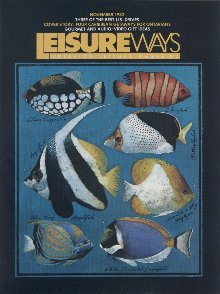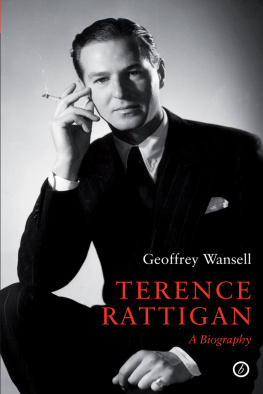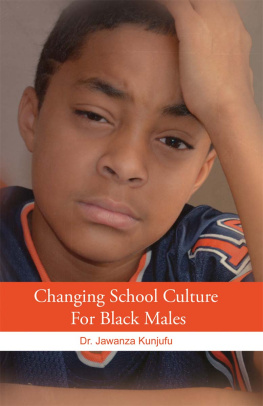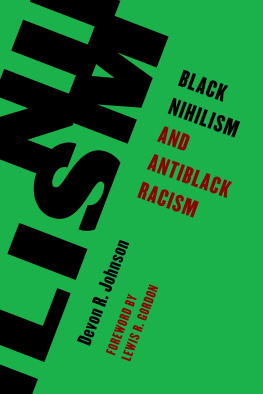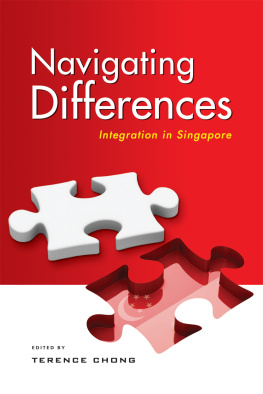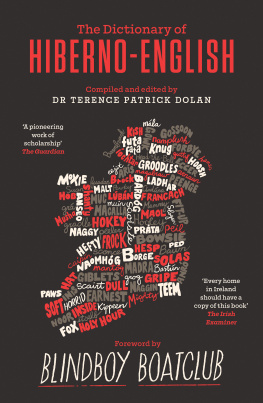First published 2015 by Paradigm Publishers
Published 2016 by Routledge
2 Park Square, Milton Park, Abingdon, Oxon OX14 4RN
711 Third Avenue, New York, NY 10017, USA
Routledge is an imprint of the Taylor & Francis Group, an informa business
Copyright 2015,Taylor & Francis.
All rights reserved. No part of this book may be reprinted or reproduced or utilised in any form or by any electronic, mechanical, or other means, now known or hereafter invented, including photocopying and recording, or in any information storage or retrieval system, without permission in writing from the publishers.
Notice:
Product or corporate names may be trademarks or registered trademarks, and are used only for identification and explanation without intent to infringe.
Library of Congress Cataloging-in-Publication Data
Fitzgerald, Terence D.
Black males and racism : improving the schooling and life chances of African
Americans / Terence D. Fitzgerald.
p. cm.
Includes bibliographical references and index.
ISBN 978-1-61205-551-0 (pbk. : alk. paper)
1. African American young menEducation. 2. African American young men
Education (Higher). 3. African American menEducation. 4. African American
young menSocial conditions. 5. African American menSocial conditions.
6. RacismUnited States. 7. Discrimination in educationUnited States. I. Title.
LC2731.F58 2014
371.82996073dc23
2014012337
ISBN 13 : 978-1-61205-550-3 (hbk)
ISBN 13 : 978-1-61205-551-0 (pbk)
Designed and Typeset by Straight Creek Bookmakers.
In 1991, a young Black director named John Singleton made a film that took the American film industry by storm. Boyz n the Hood, both written and directed by Singleton, told the story of a group of friends in South Central Los Angeles. The film was a sleeper success, and Singleton was nominated for Best Director and Best Screenplay at the Academy Awards.
What made Boyz n the Hood so unusual was that it provided a glimpse into the challenges of living in a gritty Black urban setting in contemporary America. More important, it portrayed the broad unvoiced economic, academic, and social perils of Black males in that setting. The cultural impact of the film paved the way for other movies, musical acts, popular television programs, and news specials to speak to the social, mental, and at times physical dangers experienced by Black males in America. At the same time, researchers in sociology, anthropology, medicine, education, and economics began to utilize qualitative and quantitative methods to investigate the challenges of Black men in unprecedented numbers. They shone a spotlight on issues such as rates of incarceration, worsening economic position, challenges to sense of worth, inconsistent educational opportunities, and declining physical and mental health for Black males. The racial and gender ramifications associated with being young, Black, and male were central to many academic forums and peer-reviewed journals in the early 1990s.
Unfortunately, this focus did not last. Within a few years, researchers had moved on to other topics, and there was a sense that racism was not an issue anymore. The election of the first Black male president of the United States of America solidified for some the impression that we were now living in a post-racial society that had torn down the barriers and obstacles of the past.
In this book I will argue that these supposedly dismantled racial barriers and obstacles are still in place, fully operational, and strong. Present-day racism is not only a fundamental component of American life, but its power continues to have dire consequences in the lives of racially marginalized populations. This book examines in particular the continued dominance of racial oppression within education. Relying on both current research and the first-person narratives of individual Black males discussing their experiences in public and postsecondary education, this book argues that the presence of systemic racism in our educational institutions has a frightful effect on the education and indeed entire lives of Black male students.
Educators, researchers, think tanks, education advocates, and politicians alike have given consideration to the achievement gap between Blacks and Whites, regardless of socioeconomic status (SES), which has continued to amplify in the twenty-first century. Government initiatives such as America 2000: An Education Strategy and the No Child Left Behind Act of 2001 (NCLB) were enacted to address such concerns, and educators and interested independent organizations have produced numerous studies, proposals, programs, and curriculums to study cause, effect, and possible solutions. Recently, for example, attempts to lessen the gap have led many to discard traditional grading policies and replace them with measures such as the controversial standards-based grading (SBG) system.
There has been some progress in increasing the academic success of students of color. What is often ignored in the discussion about that success, however, are the dynamics of gender. The achievement gap is not equal for Black men and women. In fact, Black males suffer from the largest achievement gap in US public education and postsecondary education, with attainment levels notably lagging behind those of White males, and have high rates of absenteeism, suspension, expulsion, and poor standardized examination results, among other things. In comparison to Black females and other racial peers, Black males are most likely to be under-represented in advanced classes and more likely to end up in a juvenile and/or adult incarceration facility due to their failed experiences within public schools.
Black males are not the only ones to face barriers in public education, but they experience a type and level of oppression that is unique. A discussion of the barriers and experiences of, for example, Latino males and Black women would be valuable. But the breadth of issues affecting Black males alone is so wide that such additional discussions are not within the scope of this book.
The manner in which race and gender play out in education is of utmost importance to any effort to improve the academic standing of Black males and avoid the social and economic repercussions from their lack of attainment. Social and academic opportunity, resources, and overall favor have always been unevenly distributed to students based on color, gender, and class. This uneven distribution has benefited Whites more than any other racial group while immobilizing those historically deemed unworthy of the full advantages of education. Though not universal, racial oppression can be found in government policies, media practices, and all sectors of societyand public and higher education are no exception. Systemic racism today remains normal and has roots in most historic institutions.
This book has three goals. First, it seeks to substantiate the continued existence of racism in education through research studies and an assortment of narratives collected from a diverse group of Black males. Through an examination of the shared stories in this book, the reader will notice that Black males are more prone to the ills of racial oppression than their predecessors, due to changes within Black families, specifically those with children born after 1970.
Second, it will attempt to illustrate the social and psychological effects of oppressive education policies, procedures, and daily interactions between Black male students and school officials. Education today has covertly and overtly affected Black males inclination to trust the world and believe in themselves. The interviews and interactions with Black males in this book exemplify how deeply their lives and futures are affected by their educational experiences.



